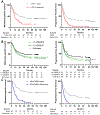Impact of Prior Treatment on the Efficacy of Adoptive Transfer of Tumor-Infiltrating Lymphocytes in Patients with Metastatic Melanoma
- PMID: 34413159
- PMCID: PMC8857302
- DOI: 10.1158/1078-0432.CCR-21-1171
Impact of Prior Treatment on the Efficacy of Adoptive Transfer of Tumor-Infiltrating Lymphocytes in Patients with Metastatic Melanoma
Abstract
Purpose: Adoptive cell transfer (ACT) of autologous tumor-infiltrating lymphocytes (TIL) can mediate durable responses in patients with metastatic melanoma. This retrospective analysis provides long-term follow-up and describes the effect of prior therapy on outcomes after ACT-TIL.
Patients and methods: Patients with metastatic melanoma underwent surgical resection of a tumor for generation of TILs and were treated with a lymphodepleting preparative regimen followed by adoptive transfer of TILs and intravenous IL2. Clinical characteristics of enrolled patients and treatment characteristics of TIL infusion products over two decades of ACT were analyzed to identify predictors of objective response.
Results: Adoptive transfer of TILs mediated an objective response rate of 56% (108/192) and median melanoma-specific survival of 28.5 months in patients naïve to anti-programmed cell death-1 (PD-1) therapy compared with 24% (8/34) and 11.6 months in patients refractory to anti-PD-1 (aPD-1). Among patients with BRAF V600E/K-mutated disease, prior treatment with targeted molecular therapy was also associated with a decreased response rate (21% vs. 60%) and decreased survival (9.3 vs. 50.7 months) when compared with those patients naïve to targeted therapy. With a median potential follow-up of 89 months, 46 of 48 complete responders in the aPD-1-naïve cohort have ongoing responses after a single treatment and 10-year melanoma-specific survival of 96%.
Conclusions: Patients previously treated with PD-1 or MAPK inhibition are significantly less likely to develop durable objective responses to ACT-TIL. While ACT-TIL is currently being investigated for treatment-refractory patients, it should also be considered as an initial treatment option for eligible patients with metastatic melanoma. See related commentary by Sznol, p. 5156.
©2021 American Association for Cancer Research.
Figures



Comment in
-
TIL in Melanoma-Similar Approaches, Different Results, Unanswered Questions.Clin Cancer Res. 2021 Oct 1;27(19):5156-5157. doi: 10.1158/1078-0432.CCR-21-2450. Clin Cancer Res. 2021. PMID: 34413160
References
-
- Goff SL, Dudley ME, Citrin DE, Somerville RP, Wunderlich JR, Danforth DN, et al. Randomized, Prospective Evaluation Comparing Intensity of Lymphodepletion Before Adoptive Transfer of Tumor-Infiltrating Lymphocytes for Patients With Metastatic Melanoma. Journal of clinical oncology : official journal of the American Society of Clinical Oncology 2016;34(20):2389–97 doi 10.1200/JCO.2016.66.7220. - DOI - PMC - PubMed
-
- Besser MJ, Shapira-Frommer R, Itzhaki O, Treves AJ, Zippel DB, Levy D, et al. Adoptive transfer of tumor-infiltrating lymphocytes in patients with metastatic melanoma: intent-to-treat analysis and efficacy after failure to prior immunotherapies. Clinical cancer research : an official journal of the American Association for Cancer Research 2013;19(17):4792–800 doi 10.1158/1078-0432.CCR-13-0380. - DOI - PubMed
-
- Radvanyi LG, Bernatchez C, Zhang M, Fox PS, Miller P, Chacon J, et al. Specific lymphocyte subsets predict response to adoptive cell therapy using expanded autologous tumor-infiltrating lymphocytes in metastatic melanoma patients. Clinical cancer research : an official journal of the American Association for Cancer Research 2012;18(24):6758–70 doi 10.1158/1078-0432.CCR-12-1177. - DOI - PMC - PubMed
Publication types
MeSH terms
Grants and funding
LinkOut - more resources
Full Text Sources
Other Literature Sources
Medical
Research Materials

